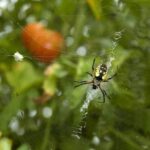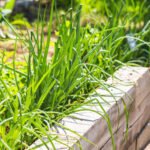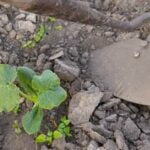Deer are a common issue for many gardeners, especially those who cultivate their own vegetable gardens. The impact of deer on vegetable gardens can be significant, with these animals often feasting on and destroying delicate crops. In this article, we will explore the various ways in which deer can affect your vegetable garden, as well as provide solutions to help mitigate the damage caused by these creatures.
One of the first steps in dealing with deer in your vegetable garden is understanding the problem at hand. Deer can cause extensive damage to vegetables, not only through direct consumption but also through trampling and damaging plants. This section will delve into the specific ways in which deer impact vegetable gardens, helping you to gain a better understanding of the challenges they pose.
Identifying deer-resistant vegetables is another important aspect of protecting your garden from these hungry herbivores. By choosing vegetables that are less appealing to deer, you can reduce the likelihood of your garden becoming a buffet for them. We will explore which types of vegetables are less likely to attract deer, providing valuable insights for gardeners looking to protect their crops from these graceful yet destructive creatures.
Identifying Deer-Resistant Vegetables
Deer can be a major nuisance for vegetable gardeners, as they have a voracious appetite for many common garden plants. However, there are certain vegetables that deer tend to avoid, making them a great choice for your garden if you live in an area with a high deer population. By choosing deer-resistant vegetables, you can minimize the damage caused by these animals and ensure a bountiful harvest.
Some vegetables that are known to be resistant to deer include root crops such as carrots, beets, and onions. These vegetables have strong scents and flavors that deter deer from feeding on them.
Additionally, members of the cabbage family, such as broccoli, Brussels sprouts, and kale, are also less appealing to deer due to their pungent taste. Other good options for a deer-resistant garden include herbs like thyme, oregano, and sage, as well as strong-smelling plants like garlic and chives.
In addition to choosing specific vegetables that are less attractive to deer, it is also important to consider the overall layout and design of your garden. For example, planting aromatic herbs or flowers around the perimeter of your vegetable garden can help mask the scent of your edible plants and discourage deer from entering.
By strategically planning your garden and selecting the right mix of deer-resistant vegetables and companion plants, you can create a beautiful and productive space that is less likely to attract unwanted wildlife.
Fencing and Other Protective Measures
Deer are a common issue for many gardeners, as they can wreak havoc on vegetable gardens if not properly managed. One effective way to keep deer out of your garden is by installing a sturdy fence. There are various types of fencing options available, each with its own pros and cons. Some popular choices include:
- Wire Fencing: This type of fencing is typically made from strong wire mesh and can be installed around the perimeter of the garden to keep deer out. It is important to ensure that the fence is tall enough (at least 8 feet high) to prevent deer from jumping over it.
- Electric Fencing: An electric fence can be an effective deterrent for deer, as it gives them a mild shock if they attempt to cross it. It is important to check local regulations and safety guidelines before installing an electric fence.
- Double Fencing: Some gardeners opt for a double-fence system, where two fences are installed a few feet apart. This creates a barrier that makes it difficult for deer to enter the garden.
In addition to fencing, there are other protective measures that can be taken to deter deer from entering your vegetable garden. For example, using motion-activated sprinklers or lights can startle and scare off deer when they approach the garden. Another option is to install repellent devices that emit ultrasonic noises that are unpleasant for deer.
Ultimately, finding the right protective measures for your garden will depend on factors such as your budget, the size of your garden, and local regulations. By taking proactive steps to protect your vegetable garden from deer, you can increase the likelihood of a successful growing season without unwanted visits from these curious animals.
Natural Deterrents
Deer are a common pest in many vegetable gardens, often causing significant damage to crops. Many gardeners turn to natural deterrents to keep these pesky animals away from their precious vegetables. By understanding how to use scent and other natural methods, you can effectively deter deer from wreaking havoc on your garden.
Scent-Based Deterrents
One of the most effective ways to deter deer is by using scents that they find unpleasant. There are many commercially available deer repellents that are made with ingredients like garlic, rotten eggs, and predator urine. These strong scents can mask the smell of your vegetables and keep deer at bay. Additionally, home remedies such as hanging bars of deodorant soap or using homemade garlic or pepper sprays around the garden can also help repel deer.
Plant-Based Deterrents
Certain plants have natural properties that repel deer due to their scent or taste. For example, planting strong-smelling herbs like mint, thyme, or lavender around the perimeter of your garden can help deter deer. In addition, planting highly aromatic flowers such as marigolds or daffodils can also make your garden less inviting to these animals.
Natural Barriers and Obstacles
Creating physical barriers and obstacles in your garden can also help deter deer. For example, strategically placing thorny or prickly plants around your vegetable patch can make it less accessible to deer. Another effective method is to create noise-making or motion-activated devices that startle the deer when they approach the garden.
By utilizing these natural deterrent methods, you can protect your vegetable garden from deer while avoiding harmful chemicals and keeping a wildlife-friendly environment.
Deer-Proofing Your Garden
Protecting your vegetable garden from deer can be a challenging but rewarding task. Here are some tips and tricks to help you keep these hungry visitors away from your precious crops:
- Use Physical Barriers: Installing a fence around your garden is one of the most effective ways to keep deer out. Make sure the fence is at least 8 feet tall, as deer are excellent jumpers. Also, consider adding an outward slant to the top of the fence to make it even harder for them to jump over.
- Plant Deer-Resistant Species: While no plant is completely deer-proof, there are certain vegetables and herbs that deer tend to avoid. Some examples include onions, garlic, chives, and thyme. By incorporating these plants into your garden, you can make it less appealing to deer.
- Utilize Scents: Deer have a strong sense of smell, so using scented deterrents can be effective in keeping them away from your garden. You can try sprinkling dried blood meal or hanging bars of fragrant soap around the perimeter of your garden to create an unappealing scent barrier for the deer.
While implementing these strategies can greatly reduce the chances of deer damaging your vegetable garden, it’s important to remember that no method is foolproof. It may take some trial and error to find the right combination of preventative measures that work for your specific situation. By being proactive and persistent in protecting your garden, you can increase the chances of enjoying a bountiful harvest without interference from hungry deer.
Understanding Deer Behavior
Deer are beautiful creatures, but they can wreak havoc on vegetable gardens. Understanding their behavior is crucial in protecting your garden. Deer feed on a wide variety of plants and can cause serious damage to vegetable gardens if left unchecked. They tend to be attracted to gardens with easy access to food and can quickly decimate a carefully tended plot.
One important aspect of understanding deer behavior is knowing that they are creatures of habit. They tend to follow the same trails and patterns, especially when foraging for food. Observing their movements and behavior can help you anticipate where they may enter your garden and take steps to deter them.
Another important element of deer behavior is their acute sense of smell. Deer rely heavily on their sense of smell to locate food, water, and potential threats. This means that using strong-smelling deterrents, such as garlic or pepper spray, can help keep them at bay. Planting strongly scented herbs like lavender or mint around the perimeter of your garden can also act as a natural repellent.
In addition, deer are most active during dawn and dusk, making these prime times for them to come into your garden to feast on your vegetables. Being aware of when they are most likely to visit can help you plan protective measures such as scare tactics or installing motion-activated sprinklers to startle them away.
| Understanding Deer Behavior | Helping Protect Your Garden |
|---|---|
| Deer are creatures of habit. | Observing movements and patterns. |
| Deer have an acute sense of smell. | Using strong-smelling deterrents. |
| Most active during dawn and dusk. | Planning protective measures accordingly. |
Creating a Wildlife-Friendly Garden
Understanding Wildlife Behavior
To create a wildlife-friendly garden, it’s important to first understand the behavior of the local deer population. By knowing their habits and preferred feeding areas, you can strategically plan your garden layout to minimize potential conflicts. For example, planting deer-resistant vegetables closer to the edge of your garden can act as a buffer zone and deter deer from venturing further into your cultivated areas.
Implementing Habitat Features
Incorporating habitat features such as brush piles, bird feeders, and water sources can attract other wildlife to your garden, providing them with alternative food options while minimizing their interest in your vegetable patch. By creating diverse habitats within your garden, you not only support a variety of wildlife but also reduce the pressure on your vegetable crops.
Utilizing Natural Deterrents
Another way to maintain a wildlife-friendly garden is by using natural deterrents to protect your vegetables. This can include planting aromatic herbs or flowers that repel deer, as well as using barriers like thorny bushes or fencing around specific areas of your garden. These methods not only discourage deer but also contribute to the overall health of your ecosystem by fostering biodiversity.
By incorporating these strategies and taking a holistic approach to gardening, you can create a space that supports both nature and food production. Balancing the protection of your vegetables with an appreciation for wildlife can lead to a mutually beneficial relationship between humans and animals in your backyard.
Success Stories
In conclusion, dealing with deer in vegetable gardens can be a challenging but manageable task. By understanding the impact of deer on vegetable gardens and identifying deer-resistant vegetables, gardeners can make informed decisions about what to plant to keep the deer away. Additionally, implementing protective measures such as fencing and natural deterrents can help keep deer out of the garden and protect valuable crops.
It’s important for gardeners to understand deer behavior and learn how to create a wildlife-friendly garden while still protecting their vegetables. Many success stories from gardeners who have effectively kept deer away from their vegetable gardens serve as inspiration for others facing similar challenges. These stories highlight the creativity and determination of individuals who have found unique solutions to address the issue of deer and vegetable gardens.
Ultimately, with persistence and the right strategies in place, gardeners can successfully coexist with local wildlife while enjoying bountiful harvests from their vegetable gardens. Finding a balance between appreciating nature and protecting one’s crops is key in creating a harmonious environment where both humans and animals can thrive. By following the tips and tricks shared by experienced gardeners, anyone can achieve success in keeping deer out of their beloved vegetable gardens.
Frequently Asked Questions
Which Garden Vegetables Will Deer Not Eat?
Deer typically avoid eating vegetables with strong smells or bitter tastes, such as onions, garlic, and leeks. They also tend to stay away from plants like tomatoes, squash, and cucumbers due to their prickly vines and leaves.
What Is the Best Deer Deterrent for Vegetable Garden?
The best deer deterrent for a vegetable garden is a combination of methods to make the area less appealing to deer. This can include using physical barriers like fences or netting, planting deer-resistant crops, using scent repellents, and even utilizing scare tactics like motion-activated sprinklers or noise-makers.
How Do You Make a Deer Resistant Vegetable Garden?
To create a deer-resistant vegetable garden, it’s important to choose plants that are known to be unappealing to deer. It’s also helpful to use fencing or netting around the garden area to physically keep deer out.
Additionally, incorporating scent repellents or other deterrents can further discourage deer from entering the garden. Regular maintenance and monitoring are key in maintaining a successful deer-resistant vegetable garden.

If you’re looking to get into vegetable gardening, or are just looking for some tips on how to make your current garden better, then you’ve come to the right place! My name is Ethel and I have been gardening for years. In this blog, I’m going to share with you some of my best tips on how to create a successful vegetable garden.





